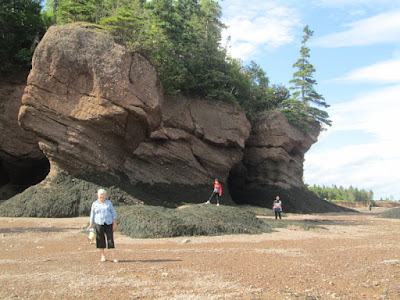It was time to head back toward the U.S. Eastern Canada had been all that I hoped plus a great deal more. There is still so much I missed, so perhaps, I will come back again someday.
Anyway, as I drove once again into New Brunswick I thought I should explore a little of the Bay of Fundy from the 'other side'.
The Bay of Fundy has been chosen as one of the 7 wonders of North America, chosen because of the highest tides on earth, the rarest whales in the world; semi-precious minerals and dinosaur fossils
It is located midway between the equator and the north-pole on Canada’s east coast, with New Brunswick to the north of the Bay and Nova Scotia to the south.
I had heard of the Bay of Fundy over the years but I had no idea of its great size, or the impact it had on the terrain and the people that settled around it.
Indian Legend:
The whale demanded to know what stopped the flow of water. Not wishing to anger the whale, Glooscap decided to abandon the project. The whale was still angry and began to hit the dam with its tail and soon the water in the bay began sloshing back and forth. The movement was so extreme that it continues even to this day."
The Hopewell Rocks attest to the amazing erosion that occurs with the rise and fall of the tides.
More stairs. When the tide returns the park rents out Kayaks to explore from a different perspective.
There were many caves tempting me to explore but they were all closed off with danger signs.
As I stood in front of one yawning maw I heard a fairly large rock hit the floor deep inside. Okay, I got the message.
Standing under this rock was a bit unnerving.
Another Legend:
"The Hopewell Rocks are actually unfortunate Mi'kmaq natives who were turned to stone by angry great whales that once lived in the Bay of Fundy. Enslaved by the whales, many of the Mi'kmaq tried to escape. Just as they reached the beach the whales transformed them into the formations which exist today."
These formations are called 'flowerpots' because of the vegetation that still grows on top.
I had walked for an hour before the tide turned and began to creep back.
It was time to go.
(Items in Italics are from the literature handed out at the Center)

















Best posting about Hopewell I have ever seen.
ReplyDeleteWow! Thank you. I truly appreciate this from a 'professional tour guide.'
ReplyDeleteGorgeous spot.
ReplyDeleteJust amazing!
ReplyDeleteWhat were the great whales angry about, I wonder?
ReplyDeleteJust a Whale God throwing a temper tantrum.
Delete